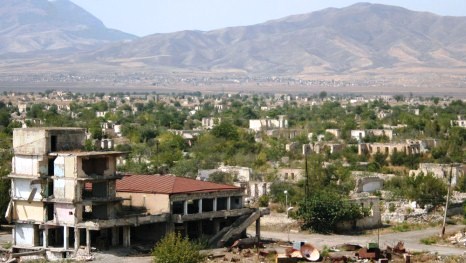Azerbaijan, Armenia deal on disputed area unlikely: Karabakh PM

A conflict between ethnic Azeris and Armenians erupted in 1991 over the area - a mountainous enclave within Azerbaijan with a majority Armenian population - after Armenian-backed forces seized it and seven surrounding Azeri districts.
A truce was signed in 1994 after about 30,000 people had been killed. But there was no peace treaty and violence still flares sporadically along the ceasefire line and Azerbaijan`s border with Armenia.
Foreign governments are wary of skirmishes in the South Caucasus due to concerns that a new conflict could erupt, threatening pipelines that carry natural gas and oil to Europe in an area where Russia, Turkey and Iran all have strategic interests.
"If we manage to end the year peacefully then that will be constructive, but in terms of concrete accords to resolve the conflict, I`m not optimistic for this year," Arayik Haroutiounian told Reuters in Paris during a visit to meet Franco-Armenian investors.
The enclave of 160,000 people runs its own affairs with heavy Armenian military and financial backing. Armenia has a security deal with Russia, while Azerbaijan has one with Turkey.
Oil-producing Azerbaijan, host to global majors including BP, Chevron and ExxonMobil, often threatens to take it back by force, though it says it favors diplomacy.
"Neither Karabakh nor Azerbaijan would benefit from a war as I don`t think either country would win outright, but we can`t rule it out," Haroutiounian said.
While he said that Nagorno-Karabakh would not strike first, his administration had, like Azerbaijan, steadily increased arms imports to ensure it could defend itself.
"I think that a new war would lead to a huge humanitarian crisis and be extremely bloody," he said.
"The losses would be much greater than before - hundreds of thousands killed and injured - because of the arms race of the last few years."
There have been several rounds of talks between the neighbors since 1994. The foreign ministers of both countries met this month for informal talks mediated by Russia, France and the United States in a team known as the Minsk Group.
Those talks, which do not include Nagorno-Karabakh representatives, have yet to yield any results, although there is hope that the re-election of Armenian President Serzh Sarksyan will give fresh impetus to finding a solution.
Sarksyan has previously accused Azerbaijan of accumulating a "horrendous quantity" of arms to prepare for a resumption of fighting. But he has also said he wants a negotiated deal.
Haroutiounian, who fought in the 1991-1994 conflict, said that for the moment public opinion in Azerbaijan and Armenia was not ready for a compromise, making it much harder for their leaders to accept any settlement.















































